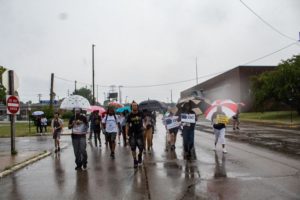A state investigation has found that the Minneapolis Police Department engaged in a pattern of racial discrimination, a finding that will allow the state’s civil rights enforcement agency to begin developing a consent decree to force the department to change its practices and policies.
The investigation found disparities in how officers use force and conduct traffic stops when they engage with Black motorists compared to white ones, said Rebecca Lucero, the commissioner of the Minnesota Department of Human Rights.
It also found that officers used “covert social media to surveil Black individuals and Black organizations, unrelated to criminal activity,” and that officers consistently used “racist, misogynistic, and disrespectful language with impunity.”
The investigation was launched two years ago in the wake of the killing of George Floyd by then-Minneapolis Police Officer Derek Chauvin, who knelt on Floyd’s neck for 9½ minutes.
Chauvin was convicted in April 2021 on state charges of second- and third-degree murder, as well as second-degree manslaughter. He was sentenced to 22½ years in prison in June. He also pleaded guilty to federal charges of violating Floyd’s civil rights.
Three former officers who were also present when Floyd died were convicted in February of depriving Floyd of his federal civil rights while acting under government authority when they failed to give him medical aid. Their state trial on charges of aiding and abetting Floyd’s murder is scheduled to begin in June.
The case was a watershed moment for discussions around race, policing and police brutality.
“Following the murder of George Floyd, demands to end discriminatory policing practices reverberated across the world,” Lucero said. “Those demands remain just as urgent today with the announcement of the investigative findings, which paints an unsettling picture of the city of Minneapolis and the Minneapolis Police Department engaging in a pattern of racial discrimination over the last decade.”
Lucero said the investigation and its findings were not based on any one officer or case. Instead, she said, it looked at the city’s policing as a whole over 10 years, using 700 hours of body camera video, nearly 480,000 pages of city and police documents and observations of about 87 hours of police academy training.
The report found that the “pattern or practice of race-based policing is caused by MPD’s ineffective oversight and accountability structures and ineffective trainings that reinforce a culture that is averse to accountability and not supportive for officers.”
“Additionally, City and MPD leaders have failed to act collectively with the urgency, coordination, and intentionality necessary to address well-known racial disparities,” it says.




